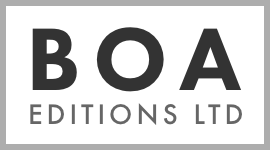Matt Donovan is the author of The Dug-Up Gun Museum, which was published by BOA Editions on November 8, 2022. Donovan's documentary poems examine the paradox of a country plagued by gun violence yet consumed with protecting the right to bear arms. Read on to learn more about Matt and his new poetry collection through this self-interview!

What inspired you to write a book focused on guns in America?
Simply put, the earliest iterations of this project grew out of a deep concern about gun violence in America. I wanted to try to understand our ongoing obsession with firearms, as well as our utter failure to enact any kind of meaningful gun law reforms, despite our shocking tallies of gun-related deaths each year. I began asking some questions, which led to more questions, which led to a gradual recognition about my own monolithic thinking about this complex issue. I realized that I needed to seek out people and conversations and experiences that might help me better understand America’s intransigent attitudes about firearms, and which I hoped might help me avoid what the poet Matthew Olzmann calls our “deadbolt of discourse” regarding guns. Many of the poems in this book stem from those travels and the resulting explorations and dialogues.
Where did you travel while writing this book? Were there any especially memorable moments?
I visited numerous places while developing these poems – Sandy Hook, Chicago, Cleveland, Las Vegas, and Cody, Wyoming to name just a few – and I remain humbled by the willingness of people to speak with me. While I encountered plenty of moments that bordered on the absurd – including a war simulation at Fort Hood, or a reenactment of D-day using paintballs in Pennsylvania – I also had many profound encounters that couldn’t help but change how I think about guns, or rupture stereotypes that I wasn’t even aware that I held. I still find myself thinking regularly about the ballistics detective in Cleveland who felt disgusted by America’s penchant for fetishizing firearms, or the gun shop owner in Cody who couldn’t imagine traveling anywhere with fewer than three guns in his car, or Pamela Bosley, whose teenage son was murdered in a drive-by shooting incident in Chicago.
I know your book was initially conceived as a work of journalistic nonfiction. What made you switch genres and instead choose to approach the topic of guns through poetry?
Writing The Dug-Up Gun Museum was a complex journey, and there were many unexpected veers along the way, including that change of genres. When I initially conceived of the project, I planned to write a nonfiction book directly linked to my travels around the country and to include conversations with different people from a range of communities who held varying opinions about guns. And yet, even though nonfiction seemed to be the most direct means of asking the questions I wanted to ask, two things began to happen that troubled me. First, I found myself inevitably trapped into repeating many of the familiar facts, statistics, and arguments that we always hear during debates about guns, and I was wary about revisiting discourse that seemed all too familiar even from the outset. Secondly, during my travels, there were many encounters and conversations that needed to be sidelined, or even omitted, due to the confining premise I’d chosen for the nonfiction iteration of the book. For instance, because I initially traveled to Cody, Wyoming to speak to residents about a proposal to arm public school personnel with concealed weapons, I was forced by default to restrict my chapter’s focus solely to that topic. Yet my trip to Cody included so many resonant and unexpected moments – including a visit to the fascinating museum which inspired the title poem of the collection – that didn’t align neatly with that school board issue, and thus risked being removed from the book altogether. The switch to poetry afforded a less prescriptive, less linear, and more image-driven, lyric engagement with the subject matter, which ended up feeling like the far better means to interrogate America’s gun obsession.

